- Home
- Isabel Allende
Portrait in Sepia Page 33
Portrait in Sepia Read online
Page 33
“What happened then, oi poa?” I asked.
“I did what I had to do, Lai Ming. Then I lay down beside Tao and kissed him for a long time. His last breath stayed with me. . . .”
EPILOGUE
If it weren’t for my grandmother Eliza, who came from far away to light the dark corners of my past, and for the thousands of photographs that have collected in my house, how could I tell this story? I would have to create it from my imagination, with no material but the elusive threads of the lives of many others and a few illusory recollections. Memory is fiction. We select the brightest and the darkest, ignoring what we are ashamed of, and so embroider the broad tapestry of our lives. Through photography and the written word I try desperately to conquer the transitory nature of my existence, to trap moments before they evanesce, to untangle the confusion of my past. Every instant disappears in a breath and immediately becomes the past; reality is ephemeral and changing, pure longing. With these photographs and these pages I keep memories alive; they are my grasp on a truth that is fleeting, but truth nonetheless; they prove that these events happened and that these people passed through my destiny. Thanks to them I can revive my mother, who died at my birth, my stalwart grandmothers, and my wise Chinese grandfather, my poor father, and other links in the long chain of my family, all of mixed and ardent blood. I write to elucidate the ancient secrets of my childhood, to define my identity, to create my own legend. In the end, the only thing we have in abundance is the memory we have woven. Each of us chooses the tone for telling his or her own story; I would like to choose the durable clarity of a platinum print, but nothing in my destiny possesses that luminosity. I live among diffuse shadings, veiled mysteries, uncertainties; the tone for telling my life is closer to that of a portrait in sepia.
P.S. INSIGHT INTERVIEWS & MORE . . .
About the author
2 Life at a Glance
3 Isabel Allende on Destiny, Personal Tragedy, and Writing
About the book
7 A Conversation with Isabel Allende
Read on
10 Have You Read? More by Isabel Allende
About the author
Life at a Glance
Author photograph © William Gordon
ISABEL ALLENDE was born in 1942 in Lima, Peru, and raised in Chile. She fled Chile after the 1973 military coup and assassination of her uncle, President Salvador Allende, and worked in Venezuela from 1975 to 1987, when she moved to the United States. She now lives in California.
Isabel has worked as a TV presenter, a journalist, and a playwright. Her first book for adults, the acclaimed House of the Spirits, was published in Spanish in 1982 and has been translated into twenty-seven languages. Since then, she has written eleven more novels, a collection of stories, and four memoirs, and her books have become bestsellers across four continents.
In 2004, Isabel was inducted into the American Academy of Arts and Letters.
Isabel Allende on Destiny, Personal Tragedy, and Writing
“Life is nothing but noise between two unfathomable silences.” Can you describe that noise, what it is, and what it means to you?
We have very busy lives—or we make them very busy. There is noise and activity everywhere. Few people know how to be still and find a quiet place inside themselves. From that place of silence and stillness the creative forces emerge. There we find faith, hope, strength, and wisdom. Since childhood, however, we are taught to do things. Our heads are full of noise. Silence and solitude scare most of us.
You often talk and write about destiny. What is destiny for you?
We are born with a set of cards and we have the freedom to play them the best we can, but we cannot change them. I was born female in the forties into a conservative Catholic family in Chile. I was born healthy. I had my shots as a child. I received love and a proper education. All that determines who I am. The really important events in my life happened in spite of me. I had no control over them: the fact that my father left the family when I was three; the 1973 military coup in Chile that forced me into exile; meeting my husband Willie; the success of my books; the death of my daughter; and so forth. That is destiny.
“The really important events in my life happened in spite of me. I had no control over them.”
Just before your daughter Paula went into a coma she said, “I look everywhere for God but can’t find him.” Do you, can you, have faith in God after such a tragedy?
Faith has nothing to do with being happy or not. Faith is a gift. Some people receive it and some don’t. I imagine that a tragedy like losing a child is more bearable if you believe in God because you can imagine that your child is in heaven.
There is a lot of autobiographical writing in your books, but no actual autobiography. Do you imagine ever writing an autobiography?
Yes, I suppose that one day I will write another memoir. I think that my book Paula has a lot about me. It is a kind of personal memoir, is it not?
Do you think that fiction has a moral purpose? Or can it simply be entertainment?
It can be just entertainment, but when fiction makes you think it is much more exciting. However, beware of authors who pound their “moral messages” into you.
You have written letters all your life, most notably a daily letter to your mother. You’ve also worked as a journalist. Which form or experience of writing helped you most when you started writing books ?
The training of writing daily is very useful. As a journalist I learned to research, to be disciplined, to meet deadlines, to be precise and direct, and to keep in mind the reader and try to grab his or her attention from the very beginning.
Does writing each book change you?
Writing is a process, a journey into memory and the soul. Why do I write only about certain themes and certain characters? Because they are part of my life, part of myself, they are aspects of me that I need to explore and understand.
You loved science fiction as an adolescent. Do you think it inspired your love of creating other worlds?
Science fiction reinforced the idea—planted by my grandmother—that the universe is very strange and complex. Everything is possible and we know very little. My mind and my heart are open to the mystery.
You always start writing on January 8, but when do you finish? How long does it take you to write your books?
I write approximately a book per year. It takes me three or four months to write the first draft, then I have to correct and edit. I write in Spanish, so I also have to work closely with my English translator Margaret Sayers Peden. And then I have to spend time on book tours, interviews, traveling, etc.
Do you have a favorite among your books?
I don’t read my own books. As soon as I finish one I am already thinking of the next. I can hardly remember each book. I don’t have a favorite but I am grateful to my first novel The House of the Spirits, which paved the way for all the others, and to Paula, because it saved me from depression.
You grew up in Chile but now live in the United States. Which country has had the most influence on your writing and why?
It is very easy for me to write about Chile. I don’t have to think about it. The stories just flow. My roots are in Chile and most of my books have a Latin American flavor. However, I have lived in the United States for many years, I read mainly English fiction, I live in English, and certainly that influences my writing.
The United States was, to a Chilean, an enemy country in the seventies. How did you overcome that and learn to love it?
I know that most Americans are not responsible for the evil that their government has done or does today abroad. Most people in this country have good intentions. They think of themselves as decent citizens and moral human beings. They want to do good. But there is great ignorance and indifference. The United States has supported in other countries the kind of brutal tyranny that it would never tolerate in its own territory. If Americans were better aware of the atrocities that have been committed in their name and with th
eir tax money they would be horrified.
Emigrants “lose their crutches” and their past is “erased.” Is that both positive and negative?
When one moves to another country as an immigrant one loses everything that is familiar. To survive one needs to draw strength from within and make double the effort of the locals to get half the results. I think that it is important to remember the past and be proud of one’s roots.
About the book
A Conversation with Isabel Allende
What was your relationship to photography prior to writing this book? Were (or are) you a photographer ?
I am not a photographer but my husband is. For many years I have been in touch with the art of photography. I’m especially fascinated by black-and-white and by old photos. They reveal the soul of the models. No wonder many tribal people are afraid of cameras, believing that pictures steal the soul.
Do you appreciate the symbolic or otherwise artistic use of photography in any particular novels?
Photography has been the subject of many novels but I didn’t look for inspiration in fiction. I researched the photographic techniques of the eighteen hundreds, including the life and art of Louis Daguerre, the inventor of photography. The poor man ended up crazy from exposure to mercurial fumes.
Aurora del Valle is such a compelling character. With her complex ethnic background—she is Chilean, Chinese, and English—she must have been a challenge to bring to life on the page. What inspired you to write about a character who is the child of three continents?
“I’m especially fascinated by black-and-white and by old photos. They reveal the soul of the models.”
I find the mixture of races very interesting, maybe because I have traveled extensively. Each place and its people are different, but when all is said and done our similarities outnumber our differences. It is astonishing to me that there is so much racial hatred and so much violent nationalism and religious fundamentalism in the world. Why is it that we tend to exclude those who are not from our own ethnic group? Diversity is the strength of any species.
In Portrait in Sepia, as in many of your novels, history is more than just a backdrop. Settings include: the War of the Pacific, when Chile fought Peru and Bolivia; the Chilean Revolution of 1891; and San Francisco’s Chinatown. How do you decide to pair a particular character with a particular event? Does one give rise to another?
Usually when I start a book I don’t know what it will be about or who the characters will be. I only have a time and a place that I have thoroughly researched. In the case of Portrait in Sepia I knew that I wanted to write about the second half of the nineteenth century in Chile, a time of war and Chilean imperialism that shaped the national character. By the time I sat down to write the book I had a lot of information but I didn’t have a story. Some characters from my previous novel, Daughter of Fortune, kept creeping back into my pages and they brought the story to me. I know it sounds crazy, but the truth is that for me the plot unfolds itself slowly in the process of writing many hours every single day for months. One thing leads to another, the characters behave like real people, and my job is to show up in front of my computer and let the story evolve.
Margaret Sayers Peden has been your English-language translator for many years. Do you collaborate closely with her on the translations? What is your working relationship like?
Margaret and I have been working together since my second novel in 1983. We know each other so well that we have developed a sort of psychic relationship. She says that I should be careful what I write because it may happen to her! She lives in Missouri and I live in California, but we are constantly in touch by e-mail and telephone. She sends me every thirty or forty pages of the translation, which I read carefully and send back to her with my comments. She doesn’t need my input. She does a splendid job.
Aurora struggles to understand a mystery from her past that has cast a shadow on her life. To what extent do our memories of the past define who we are? Can we be free of our pasts?
Memory is very important and can sometimes define our personality, but I think that most healthy and normal people can live with their past and draw strength and knowledge from it. For a writer memory is essential. In my life the past is always in my mind but not in a negative way. I don’t want to be free from it. I want to use it in my writing and in my life.
Portrait in Sepia ends with a memorable epilogue in which Aurora reflects on the story she has just told. One passage reads: “I write to elucidate the ancient secrets of my childhood, to define my identity, to create my own legend. In the end, the only thing we have in abundance is the memory we have woven.” How are your own reasons for writing similar to—or different from—Aurora’s?
That paragraph is me talking. Aurora feels about her photography as I do about my writing.
Many of the characters in this novel are part of a family of characters that also appears in House of the Spirits and Daughter of Fortune. Do you think you’ll ever revisit the del Valles and the Sommerses in future novels?
I can’t predict what I will be writing in the future. Each year on January 8 I try to start a book. I have no idea what the next one will be. I am totally focused on the current project. The idea of writing a sequel to The House of the Spirits has been in the air for many years. People—including some publishers—keep suggesting to me that it could be interesting, but at the present moment I am not planning anything of the sort.
Read on
Have You Read? More by Isabel Allende
The following books are also available in Spanish from Rayo, and can be found at www.harpercollins.com.
ISLAND BENEATH THE SEA
* * *
Born a slave on the island of Saint-Domingue, Zarité—known as Tété—is the daughter of an African mother she never knew and one of the white sailors who brought her into bondage. Although her childhood is one of brutality and fear, Tété finds solace in the traditional rhythms of African drums and the voodoo loas she discovers through her fellow slaves.
When twenty-year-old Toulouse Valmorain arrives on the island in 1770, he has powdered wigs in his trunks and dreams of financial success in his mind. But running his father’s plantation, Saint Lazare, is neither glamorous nor easy. Although Valmorain cruelly purchases young Tété to be his bride, it is he who will become dependent on the services of his teenage slave.
Against the merciless backdrop of sugarcane fields, the lives of Tété and Valmorain grow ever more intertwined. When the bloody revolution of Toussaint Louverture arrives at the gates of Saint Lazare, the couple flees the brutal conditions of the French colony that will become Haiti for the raucous, free-wheeling enterprise of New Orleans. There Tété finally forges a new life, but her connection to Valmorain is deeper than anyone knows and not easily severed. With an impressive richness of detail, and narrative wit and brio second to none, Allende crafts the riveting story of one woman’s determination to find love amid loss, to offer humanity though her own has been battered, and to forge her own identity in the cruelest of circumstances.
INÉS OF MY SOUL
* * *
This magisterial work of historical fiction recounts the astonishing life of Inés Suarez, a daring Spanish conquistadora who toiled to build the nation of Chile—and whose vital role has too often been neglected by history.
It is the beginning of the Spanish conquest of the Americas, and when Inés’s shiftless husband disappears to the New World, she uses the opportunity to search for him as an excuse to flee her stifling homeland and seek adventure. After a treacherous journey to Peru, she learns of his death in battle. She meets and begins a passionate love affair with a man who seeks only honor and glory: Pedro Valdivia, war hero and field marshal to the famed Francisco Pizarro. Together, Inés and Valdivia will build the new city of Santiago and wage a ruthless war against the indigenous Chileans. The horrific struggle will change them forever, pulling them toward their separate destinies.
Inés of My Soul is a work of b
reathtaking scope, written with the narrative brilliance and passion readers have come to expect from Isabel Allende.
“Riveting. . . . It simply captivates. . . . A colorful and clear-eyed portrait of a woman and a country.”
—Chicago Sun-Times
“A powerfully evocative narrative. . . . Allende is at her best here .”

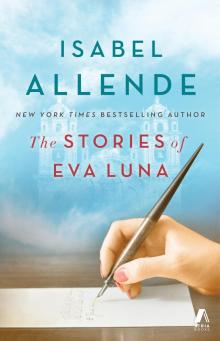 The Stories of Eva Luna
The Stories of Eva Luna The House of the Spirits
The House of the Spirits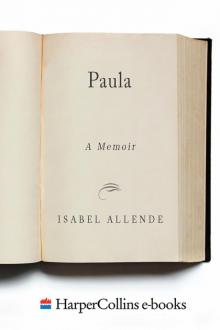 Paula
Paula Ines of My Soul
Ines of My Soul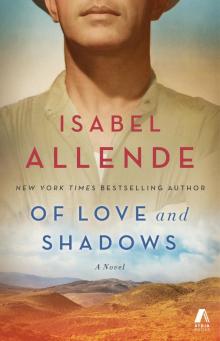 Of Love and Shadows
Of Love and Shadows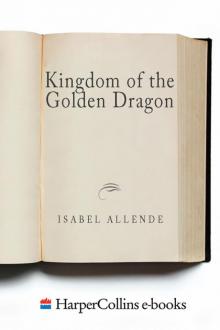 Kingdom of the Golden Dragon
Kingdom of the Golden Dragon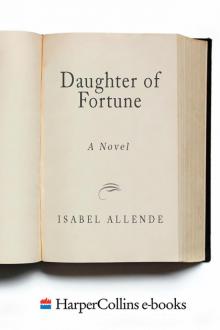 Daughter of Fortune
Daughter of Fortune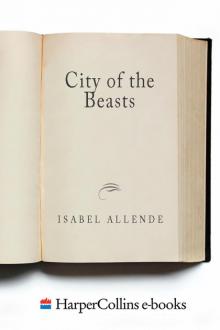 City of the Beasts
City of the Beasts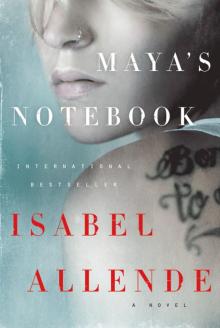 Maya's Notebook
Maya's Notebook Eva Luna
Eva Luna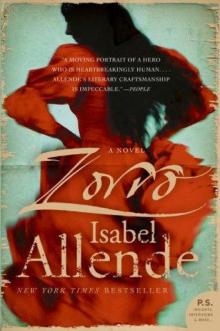 Zorro
Zorro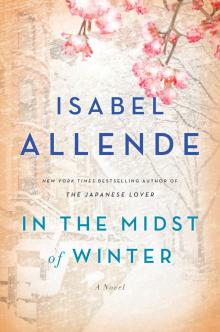 In the Midst of Winter
In the Midst of Winter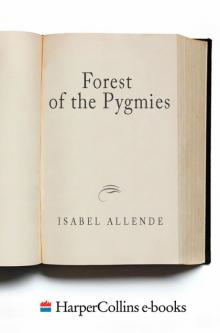 Forest of the Pygmies
Forest of the Pygmies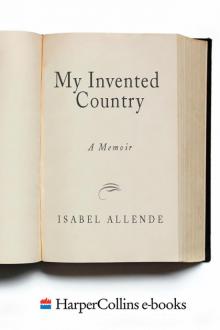 My Invented Country: A Nostalgic Journey Through Chile
My Invented Country: A Nostalgic Journey Through Chile The Japanese Lover
The Japanese Lover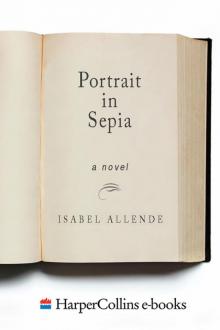 Portrait in Sepia
Portrait in Sepia Island Beneath the Sea
Island Beneath the Sea The Soul of a Woman
The Soul of a Woman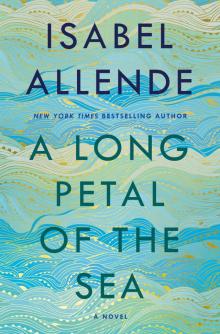 A Long Petal of the Sea
A Long Petal of the Sea Ines of My Soul: A Novel
Ines of My Soul: A Novel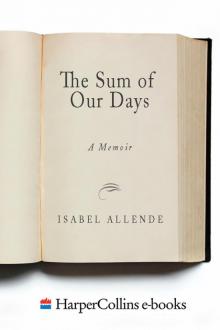 The Sum of Our Days
The Sum of Our Days